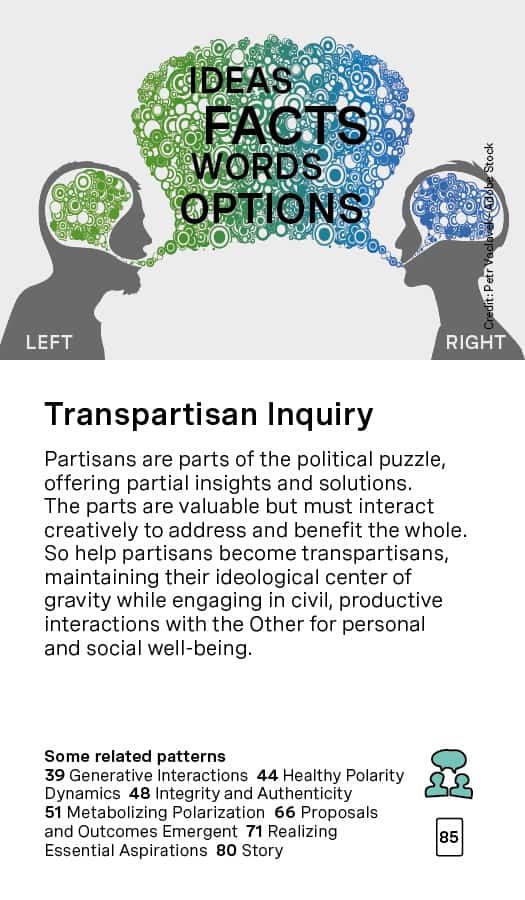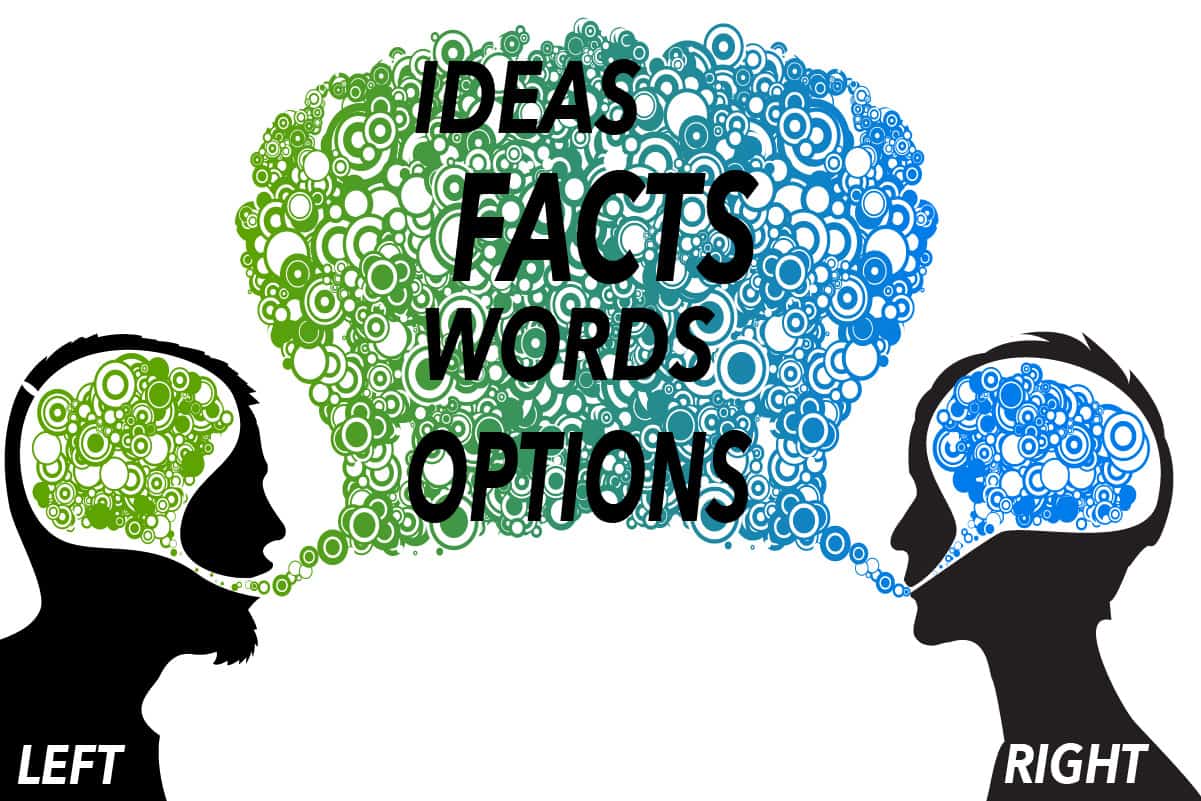Pattern #85
Pattern Card
Click to enlarge or download Pattern Card.
Buy or Download
To buy or download the complete Wise Democracy Card Deck use the Buy & Download button.
Comments
We invite your participation in evolving this pattern language with us. Use the comment section at the bottom of this page to comment on its contents or to share related ideas and resources.
Transpartisan Inquiry
Credit: Petr Vaclavek – Adobe Stock
Pattern Heart
Partisans are parts of the political puzzle, offering partial insights and solutions. The parts are valuable but must interact creatively to address and benefit the whole. So help partisans become transpartisans, maintaining their ideological center of gravity while engaging in civil, productive interactions with the Other for personal and social well-being.
Some related patterns: 39 Generative Interactions 44 Healthy Polarity Dynamics 48 Integrity and Authenticity 51 Metabolizing Polarization
66 Proposals and Outcomes Emergent 71 Realizing Essential Aspirations 80 Story
Transpartisan Inquiry – going deeper …
This is an edited version of the video on this page.
This comes out of my knowledge of American politics and to a certain extent the politics of European and other countries. In many places there are two major parties which tend to be identified with the Left and the Right. In a polarized system that tends to be a really good way to frame it. Most of the Left and Right parties have big grains of truth in what they are trying to say. But they are framed in ways that allow them to battle over who gets the power.
But I am coming from a collective intelligence/collective wisdom perspective, rather than a power perspective, and looking at the fact that these sides both have a vital part of the truth, if we can get them to not fight together, but to work together, to include the valuable parts of their insights into what gets to be actually done, things that actually make sense rather than wheeling and dealing behind the scenes which doesn’t actually have to do with substantive issues at hand, or negotiation, where people are trying to get the better of each other.
I’m looking for actual creative insights, creative interactions, where people are trying to address the whole: “What is the best solution for everyone in this situation, and what perspectives or resources do I have to help bring that about?”
In the United States there is a transpartisan movement. I don’t know to what extent it has expanded to other countries. It’s still useful as a concept. It’s not that they are trying to become the same kind of holistic thinkers, so much as coming from a position of “This is who I am, I am a Republican or a Democrat (in the United States),” or “I am liberal or conservative,” or “I am a Green,” or “I am a Libertarian,” whatever it is. “And although I am that, I really want to get where you’re coming from. You are so different from me, and I want you to get where I am coming from, and for us to look at that and deconstruct it a bit, and see what we each have to offer, and to try and learn from each other and be creative without ever giving up what we feel.”
This is very different from, “I want to change myself to shake off the partisan of frame of reference totally from my world, and become somebody who is simply seeking the common ground, the thing that will most commonly benefit everybody.” But it’s a very useful stance, and having whoever is partisan maintain this attitude, allows for people to actually work together across major divides and there’s ways to support that.
Video Introduction (6 min)
Examples and Resources
- Sweden’s Almaden Week
Link-Wikipedia
Report Democracy Now - Living Room Conversations
Link - AllSides Link
- Public Conversations Project
Link-What is essential - Coffee Party Link
- Transpartisan Movement
Link-Mediators Foundation
Link-Tom Atlee Blog - A Personally Transformative Encounter of Left and Right Link
- In the book “You are not as crazy as I thought” two people from the left and the right interact in a conversation to clarify what they each believe, listening to each other as best as they can.
Link - The Third Side Link
- Polarities of Democracy Model Link
- Transpartisan Youth Camp Link
- My Country Talks Link
- The War on Sensemaking, Daniel Schmachtenberger Link-video
- Better Angels debate Link
- Bridge the Divide Link
- BridgeUSA Link
- The Listen First Project Link
- America in One Room Link
- Looking for America Link
In Sweden – and I have a blog post about this – they have an Almaden Week, where there’s a big celebration with booths and activities and people who are promoting their political perspectives and their political options, and they organize conversations between these people. It is an actual celebration, people take time off to go and do this thing. And I think they go singing together. It’s one of the most dramatic examples of the kind of transpartisanship that this pattern points to.
In the US there’s a “Living Room Conversations” project which involves getting together people from opposite perspectives. You have a person who is a liberal, a person who is conservative, say, the left and right positions. They are friends but sort of ideological enemies. They each bring two or three likeminded friends with them to talk in somebody’s living room, and to try to understand each other.




There’s an interesting initiative that’s been taking place called My Country Talks. A German friend of mine told me about it and it started in Germany organised by Die Zeit newspaper. They set up My Country Talks to bring people together who disagree on important issues and might otherwise not get to meaningfully explore where they disagree and why. Zeit Online recruited people to take part in My Country Talks through a short yes/no survey focussing on divisive issues such as relations with Russia or the number of refugees Germany takes in, which was completed by 12,000 people. From this group, 600 pairs were matched to discuss their differing views, explore and understand the reasoning behind them. Over three-quarters of those involved gave positive feedback and suggestions for how it could improve so the organisers ran a second round of discussions. The second time, 20,000 people registered within a month, demonstrating the popularity of the idea.
It has now spread to other European countries run through national and regional newspapers https://www.mycountrytalks.org/
Thanks, Andy. I’ve logged it for posting as a resource for this pattern.
Transpartisan Inquiry speaks to me of integrating polarities, of transcending and including as a wise “whole.” I imagine facilitation processes which honor the underlying values and needs of all involved and, instead of our current “win-lose” or “tyranny of the majority” model, where one “part” works to dominate the others, we’re able to arrive at the “win-win” for all parts, the “omni-considerate-win” for the whole.
Yes – AND what makes this pattern different from patterns like “Metabolizing Polarization” and “Generating Shared Orientation” is that it is not very oriented towards outcomes or agreement. Its focus is on the ideological integrity and safety of the partisan participants and their willingness to talk with each other authentically but not expecting to change each other. It is closer to the “Nurturing Social Capital” pattern (specifically, “bridging capital” from relationships between groups).